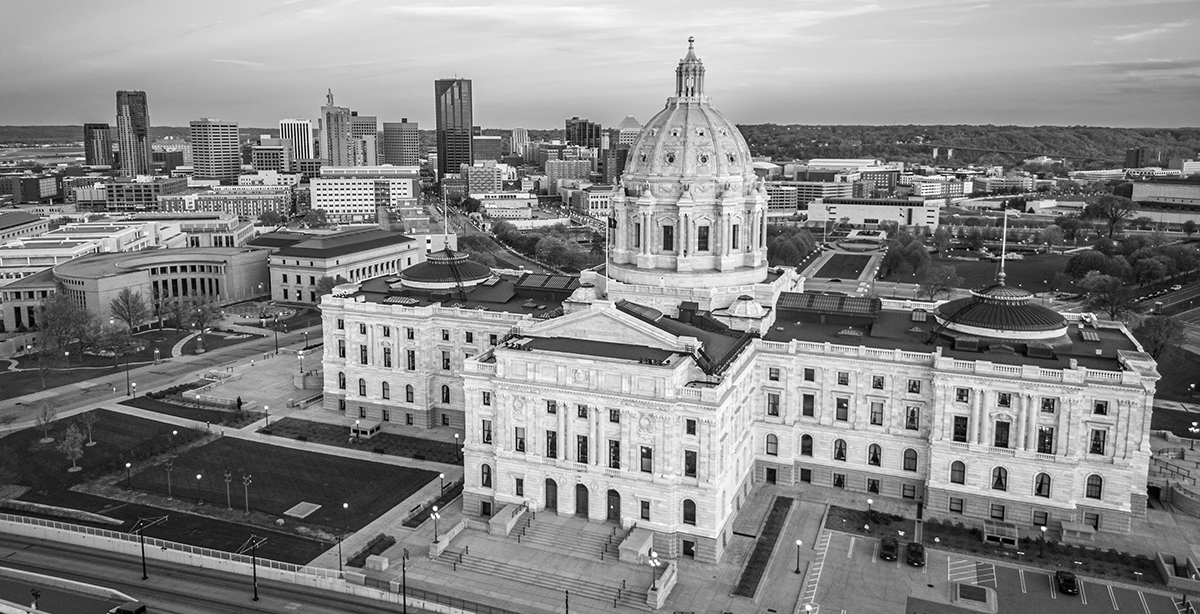Session Overview
The Minnesota Legislature convened on January 14, 2025, but not without controversy. The House of Representatives was in a deadlock of 67-67 tie. On January 24, 2025, the Minnesota Supreme Court held that 68 members are necessary to constitute a quorum of the House, invalidating the first two weeks of introduced bills. Two weeks later, on February 6, a power-sharing agreement was signed for the House to officially convene. The legislative session saw the introduction of over 6,800 bills and the passage of approximately 30 bills.
The regular session concluded on May 19, 2025, with many budget measures left in conference committees. Leaders signed an agreement to continue working on the remaining budget bills that were not passed during the regular session via working groups. After agreements were finalized, a special session was convened on June 9, 2025 to formally pass these measures.
Here is what you may have missed:
Data Centers
Representative Greg Davids (R) sponsored HF 16, a data center regulatory measure that was passed during the special session. This measure states that a proposed data center project that may use more than one hundred million gallons of water per year and requires an amended or new permit must notify the Department of Natural Resources. The measure requires a qualified large-scale data center to pay a fee to the Public Utilities Commission between two million and five million dollars based on energy demand on an annual basis.
Cannabis
Senator D. Scott Tribble (DFL) championed SF 2370, which was enacted on May 23. The measure is a cannabis omnibus bill, revising provisions that were passed as part of the state’s effort to legalize cannabis. The measure provides that a product sold for human or animal consumption may not contain more than 0.3 percent of any tetrahydrocannabinol. It also states that an edible cannabinoid product cannot be sold if it contains more than 5 milligrams of any tetrahydrocannabinol in a single serving or more than 10 milligrams per serving if intended to be consumed as a beverage. Legislators have already noted additional revisions related to local regulation of cannabis licenses will need to be debated during the next legislative session.
Budget Part I
Agriculture and Product Regulation
Representative Paul Novotny (D) sponsored HF 2446, one of several budget bills that were signed by Governor Tim Walz (D). Under this measure, several provisions of interest in agriculture and product regulation were outlined. This measure requires licensure for meat packaging companies and their agents annually. These entities will follow similar licensure requirements to livestock dealers. This measure clarifies that beginning January 1, 2026, the Commissioner of Agriculture may not register any product if the product contains intentionally added PFAS unless the commissioner determines that the use of PFAS is currently unavoidable. Such products include carpets or rugs, cleaning products, cookware, cosmetics, dental floss, fabric treatments, juvenile products, menstruation products, textile furnishings, ski wax, and upholstered furniture. This follows the passage of a PFAS restriction bill which was signed by Governor Walz in 2023.
Budget Part 2
The Minnesota Legislature convened for a one-day special session on June 9 to pass the remainder of the two-year $66 billion state budget for the 2026-27 biennium. Here are some of the major budget provisions that passed:
- This measure extends the subset for the sales tax exemption for qualified data centers to the earlier of 20 years of the date of the first qualifying purchase, or June 30, 2062.
- This measure appropriates $1.5 million for fiscal year 2026 for a grant to Minnesota STEM Ecosystem to support STEM learning opportunities, including high school and college internships, use of virtual reality technology, and workforce development within the science and technology areas.
- This measure exempts class B firefighting foam used in hangar-fixed firefighting systems at an airport until January 1, 2028, from the prohibition against manufacturing, and selling class B firefighting foam containing PFAS.
- This measure creates a state PBM process and requires the commissioner of human services to select a state pharmacy benefit manager through procurement. The state pharmacy benefit manager must upon request, disclose all sources of payment it receives for prescribed drugs provided for a managed care plan.
- The measure requires that a drug manufacturer must submit to the commissioner the following supplementary information associated with prescription drugs that either had a price more than $100 or were used for treatment over a thirty-day supply: the year the prescription drug was introduced for domestic sale, the number of sellable units during the previous 12-month period, and the total rebate payment account accrued for the product over the aforementioned period.
Looking Ahead:
The Minnesota Legislature works on a biennium which means all bills carry over from the 2025 session to the 2026 legislative session. The Minnesota interim is fairly active with committees meeting over the summer and fall to discuss policy and possible bill drafts for the next session.
A special election will be held before the legislature reconvenes in February to fill the seat of former Speaker of the House Melissa Hortman, who was tragically assassinated on June 14. Until the special election is held, the House will be composed of 67 Republicans and 66 Democrats.
